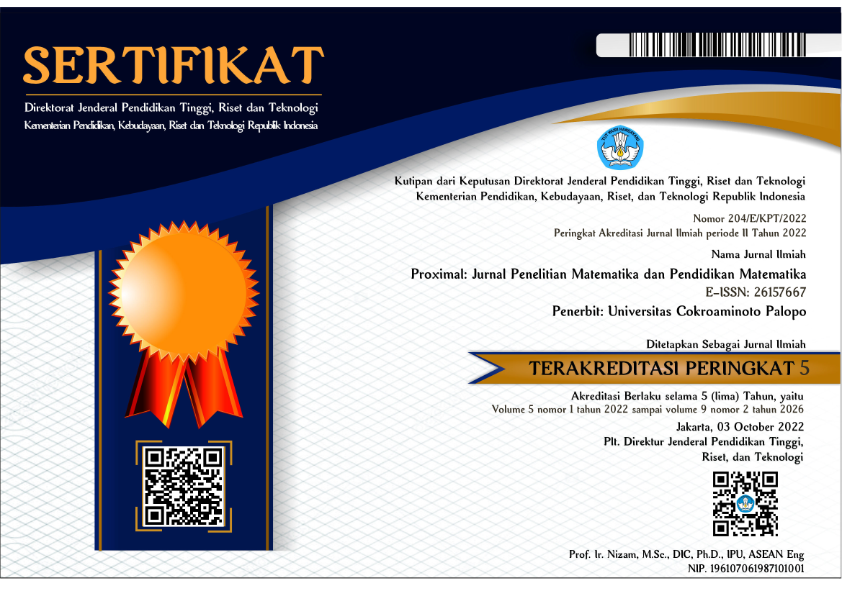Peningkatan Kemampuan Berpikir Kritis Matematika Siswa dan Habbits of Mind (Striving for Accuracy) Melalui Pembelajaran Berbasis Masalah
Keywords:
Habits of Mind (Striving for Accuracy), Kemampuan Berpikir Kritis, Pembelajaran Berbasis MasalahAbstract
Jenis Penelitian ini adalah penelitian eksperimen yang bertujuan untuk mengetahui (1) kemampuan berpikir kritis dan habits of mind (striving for accuracy) sebelum dan setelah penerapan model pembelajaran berbasis masalah pada siswa kelas VIII MTs Negeri kota Palopo, (2) kemampuan berpikir kritis dan habits of mind (striving for accuracy) sebelum dan setelah penerapan model konvesional pada siswa kelas VIII MTs Negeri kota Palopo, (3) perbedaan peningkatan kemampuan berpikir kritis antara siswa yang diajar dengan model pembelajaran berbasis masalah dan siswa yang diajar dengan pembelajaran konvensional pada siswa kelas VIII MTs Negeri kota Palopo. desain penelitian yang digunakan untuk keperluan penelitian yaitu Two Group Pretest-Posttest Design. Satuan eksperimen dalam penelitian ini adalah seluruh kelas VIII yang ada pada MTs Negeri Kota Palopo tahun ajaran 2017/2018 yang terdiri dari sembilan kelas. Pengambilan sampel pada penelitian ini dengan menggunakan metode purposive sampling. Kelas VIIIE sebagai kelas eksperimen dan kelas VIIID sebagai kelas kontrol. Hasil penelitian ini adalah (1) Hasil angket habits of mind (striving for accuracy) pada kelas eksperimen setelah diterapkan model pembelajaran berbasis masalah berada pada kategori pelajar, begitu pula (2) hasil angket habits of mind (striving for accuracy) pada kelas kontrol setelah diterapkan model pembelajaran konvensional berada pada kategori pelajar, (3) terdapat perbedaan peningkatan rata-rata kemampuan berpikir kritis pada siswa kelas VIIIE yang diajar dengan pembelajaran berbasis masalah (PBM) dengan siswa kelas VIIID yang diajar dengan Pembelajaran konvensional.
Downloads
References
Apriyanti, H. (2014). Implementasi pendekatan pembelajaran saintifik untuk meningkatkan haasil belajar siswa pada mata pelajaran matematika. Bandung: Universitas Pendidikan Indonesia.
Ashari, N. W., & Salwah, S. (2017). Problem Based Learning (PBL) dalam Meningkatkan Kecakapan Pembuktian Matematis Mahasiswa Calon Guru. JMPM: Jurnal Matematika dan Pendidikan Matematika, 2(2), 100-109.
Costa, A. L., & Kallick, B. (2009). Habits of Mind : Across the Curriculum Practical and Creative Strategies for teacher. Virginia: Association for Supervision and Curriculum Development (ASCD).
Herman, T. (2007). Pembelajaran Matematika Berbasis Masalah Untuk Meningkatkan Kemampuan Penalaran Matematika SMP. Educationist, 1(1), 48.
Husnidar, Ikhsan, M., & Rizal, S. (2014). Penerapan Model Pembelajaran Berbasis Masalah untuk Meningkatkan Kemampuan Berpikir Kritis dan Disposisi Matematis Siswa. 1(1), 72.
Miliyawaty, B. (2014). Urgensi Strategi Disposition Habits Of Mind Matematis. Infinity, 3(2), 174.
Rusman, T. W. (2015). Pengembangan Perangkat Pembelajaran Berbasis Kooperatif Tipe Jigsaw Dengan Melibatkan Scafolding Untuk Pokok Bahasan Bangun Ruang Sisi Datar Pada Kelas VIII SMP Negeri 1 Walenrang. Palopo: Universitas Cokroaminoto Palopo.
Salwah. (2014). Peningkatan Kemampuan Berpikir Kritis Matematis dan Habits of Striving for Accuracy and Precision (HSAP) melalui Pendekatan Realistic Matematics Education (RME) Berbasis Gaya Kognitif Siswa Kelas VII. Bandung: Universitas Pendidikan Indonesia.
Salwah. (2018). Habit Of Striving For Accuracy And Precision (Hsap) Melalui Pendekatan Realistic Mathematics Education Berbasis Gaya Kognitif. Journal of Mathematics Education, 3(1).
Sangkiri, Y. A. (2015). Pengaruh Model Pembelajaran Berbasis Masalah Terhadap Hasil Belajar Matematika Siswa Kelas X SMA Negeri 1 Walenrang. Palopo: Univrsitas Cokroaminoto Palopo.
Downloads
Published
How to Cite
Issue
Section
License
In submitting the manuscript to the journal, the authors certify that:
- They are authorized by their co-authors to enter into these arrangements.
- The work described has not been formally published before, except in the form of an abstract or as part of a published lecture, review, thesis, or overlay journal.
- That it is not under consideration for publication elsewhere,
- That its publication has been approved by all the author(s) and by the responsible authorities – tacitly or explicitly – of the institutes where the work has been carried out.
- They secure the right to reproduce any material that has already been published or copyrighted elsewhere.
- They agree to the following license and copyright agreement.
License and Copyright Agreement
Authors who publish with this journal agree to the following terms:
- Authors retain copyright and grant the journal right of first publication with the work simultaneously licensed under Creative Commons Attribution License (CC BY 4.0) that allows others to share the work with an acknowledgment of the work's authorship and initial publication in this journal.
- Authors are able to enter into separate, additional contractual arrangements for the non-exclusive distribution of the journal's published version of the work (e.g., post it to an institutional repository or publish it in a book), with an acknowledgment of its initial publication in this journal.
- Authors are permitted and encouraged to post their work online (e.g., in institutional repositories or on their website) prior to and during the submission process, as it can lead to productive exchanges, as well as earlier and greater citation of published work.















